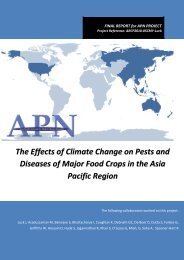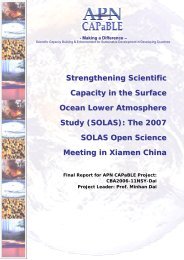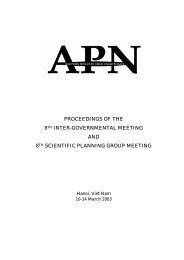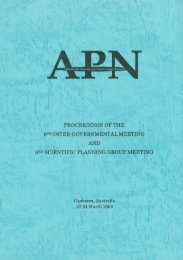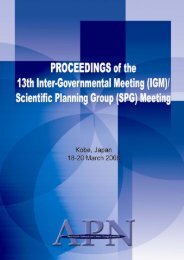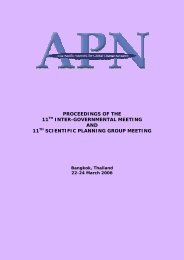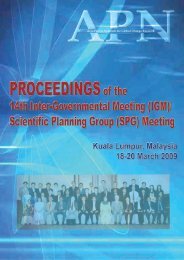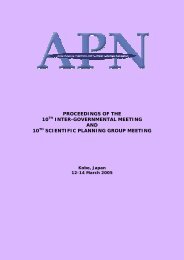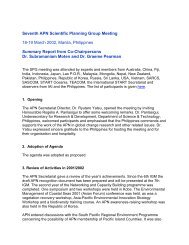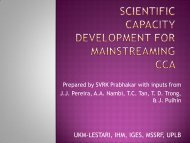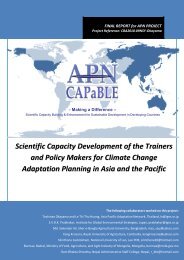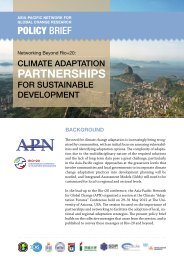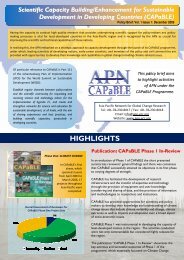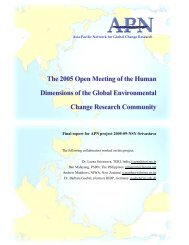APN Newsletter - Asia-Pacific Network for Global Change Research
APN Newsletter - Asia-Pacific Network for Global Change Research
APN Newsletter - Asia-Pacific Network for Global Change Research
Create successful ePaper yourself
Turn your PDF publications into a flip-book with our unique Google optimized e-Paper software.
Collaborative <strong>Research</strong> on Sustainable Urban Water<br />
Quality Management in Southeast <strong>Asia</strong>n Countries:<br />
Comparative Analysis of Current Status and Strategic<br />
Planning <strong>for</strong> Sustainable Development<br />
Reference No.: ARCP2010-01CMY-Sthiannopkao<br />
Project Leader: Suthipong Sthiannopkao<br />
http://www.apn-gcr.org/resources/items/show/1564<br />
The objectives of this study were to: (1) Develop<br />
analytical tools <strong>for</strong> policy-makers to use in their<br />
decision-making processes <strong>for</strong> sound urban water<br />
quality management; (2) Develop a database <strong>for</strong><br />
both scientists and policy-makers future research and<br />
decision-making work; and (3) Build capacity of both<br />
scientists and policy-makers on sustainable management<br />
of urban water quality in Southeast <strong>Asia</strong>.<br />
The areas studied were: (1) Phnom Penh, Cambodia:<br />
Tonle Sap and Bassac Rivers; (2) Bandung, Indonesia:<br />
Citarum River; (3) Bangkok, Thailand: Lower Chao<br />
Phraya River; and (4) Ho Chi Minh City, Viet Nam:<br />
Saigon River.<br />
Five analytical tools were applied and/or developed<br />
as a strategic plan <strong>for</strong> sustainable urban water quality<br />
management by participating scientists and policymakers.<br />
The Indonesian research team applied SWOT<br />
(Strengths, Weaknesses, Opportunities and Threats)<br />
<strong>for</strong> analysing water quality management policies in<br />
the four cities examined. SWAT (Soil and Water Assessment<br />
Tool) was applied to predict water quality in the<br />
Chao Phraya River, Thailand, by a participating USA<br />
member. WQI (Water Quality Index) and WSI (Water<br />
Sustainability Index) were developed <strong>for</strong> monitoring<br />
urban water quality in Viet Nam and Thailand, respectively,<br />
by a team from these two countries.<br />
Furthermore, risk assessment of water quality resulting<br />
from trace metals and pathogens was conducted<br />
by researchers from Korea and Taiwan. Moreover, a<br />
database <strong>for</strong> water quality, and its related data <strong>for</strong> a<br />
WQI, was built (www.apn-seawed.com). In addition,<br />
eight persons (two from Cambodia, one from Indonesia,<br />
one from Thailand and four from Viet Nam), participating<br />
in this research project have been offered<br />
at chance as an intern <strong>for</strong> their training on water<br />
sampling, analysis and management at Gwangju<br />
Institute of Science and Technology (GIST), Republic<br />
of Korea, with full financial support. Five meetings<br />
were organized in different Southeast <strong>Asia</strong>n cities<br />
(Bangkok, Bali, Manila, and Ho Chi Minh City) to allow<br />
both local participants and <strong>APN</strong> members to share<br />
and exchange their work experience and knowledge<br />
on sound management of urban water quality.<br />
In the last meeting, all <strong>APN</strong> members (both scientists<br />
and policy-makers) reached an agreement to<br />
continue the present project with additional funding<br />
from both <strong>APN</strong> and local sources in the following<br />
areas:<br />
1. Analytical tools developed <strong>for</strong> urban water quality<br />
management — to be tested at Bangkok Metropolitan<br />
Administration and other participating<br />
countries in Southeast <strong>Asia</strong>.<br />
2. The current database to be expanded to cover<br />
all 10 Southeast <strong>Asia</strong>n nations, with added functionalities<br />
<strong>for</strong> data interpretation.<br />
3. SWAT to be further developed as a tool to predict<br />
urban water quality as a result of human activities<br />
and climate change.<br />
4. Training workshops to be organized in all 10<br />
Southeast <strong>Asia</strong>n countries to build capacity of lo-<br />
ARCP-Funded Projects •<br />
29<br />
ARCP-Funded Projects



